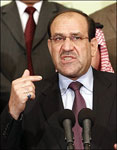 New York Times: The strategy we should have had for Iraq was to slowly transition from military presence by building Iraqi capacity to maintain security and grow political institutions that would frame and ensure representative governance in Iraq. President Obama’s rush to the exits precludes that outcome.
New York Times: The strategy we should have had for Iraq was to slowly transition from military presence by building Iraqi capacity to maintain security and grow political institutions that would frame and ensure representative governance in Iraq. President Obama’s rush to the exits precludes that outcome.
Kori Schake
The New York Times
 The strategy we should have had for Iraq was to slowly transition from military presence by building Iraqi capacity to maintain security and grow political institutions that would frame and ensure representative governance in Iraq. President Obama’s rush to the exits precludes that outcome. The arbitrary timelines for withdrawal coupled with desultory political engagement produced a predictable Iraqi political crisis. Politics at their highest level have seized up and are fracturing along sectarian lines, an occurrence precipitated and taken advantage of by Prime Minister Nuri Kamal al-Maliki.
The strategy we should have had for Iraq was to slowly transition from military presence by building Iraqi capacity to maintain security and grow political institutions that would frame and ensure representative governance in Iraq. President Obama’s rush to the exits precludes that outcome. The arbitrary timelines for withdrawal coupled with desultory political engagement produced a predictable Iraqi political crisis. Politics at their highest level have seized up and are fracturing along sectarian lines, an occurrence precipitated and taken advantage of by Prime Minister Nuri Kamal al-Maliki.
This is not what Iraqis wanted, not what they voted for. The political culture of Iraq was trending toward trust beyond sectarian lines, political leaders seeing electoral benefit in reaching across religious communities and emphasizing the achievements of governing.
For the Obama administration, the exit is the strategy for Iraq. What can be done within the political, economic, diplomatic and military parameters set by the administration’s disinterest? First, we must stop turning a blind eye to Prime Minister Maliki’s creeping authoritarianism. Maliki returned from his White House meeting declaring the end of the war and issued an arrest warrant for his vice president. The White House was silent, as it has been on Maliki’s earlier unconstitutional arrogation of power and political machinations, such as arresting hundreds of Sunnis and striking candidates from electoral lists. While it is probably too much to expect the Obama administration to vigorously contest what is occurring in Iraq’s internal politics, we ought at least to bear witness. We have no less responsibility in Iraq — more, in fact — than in other countries where leaders abuse power to the detriment of their population.
Second, our strategy now should be to engage vigorously and broadly to build civil society. Within current constraints, we probably cannot affect the choices of current political leaders. But we can, and are traditionally good at, growing leaders with greater commitment to the principles of democratic governance and helping construct institutions that bound the range of any individual leader’s reach. Iraq desperately needs help shoring up the independence of its judiciary, the transparency of its electoral system and the accountability of the leadership.
Third, we need to explain ourselves better, more often, and more publicly to reduce continuing Iraqi suspicion. The 16,000 contractors providing security and support to the U.S. mission, recent revelations about drone aircraft operated by contractors, and the not uncommon conspiracy-mindedness of societies emerging out of decades of authoritarianism have caused some Iraqi members of Parliament to consider the civilian mission a new colonialism. We need to dispel that notion, and quickly, if we are to sustain the basis for meaningful engagement inside Iraq.
Fourth, we should expend much more effort bringing Iraq into our regional relationships. Other Middle Eastern states remain hostile to Iraq, for a variety of reasons: historical grievance, sectarian suspicion, concern about collusion between Iraq and Iran, Prime Minister Maliki’s refusal to support Arab League sanctions on Syria. We have done too little to kluge together countries in the region in ways that will reduce Iraq’s uniqueness and Iraqis’ concern about our role in their country and in the region.
Congress should demand that the administration produce a plan with measurable objectives for what our mission in Iraq will achieve. We hold our military to that standard, and we should expect the same of our diplomats. Our civilian mission in Iraq is operating at a handicap because of the president’s policies, but that is no excuse for not achieving a broad-based relationship with Iraqis that will hold their government accountable and foster the institutions and practices of representative government.
Kori Schake is a research fellow at the Hoover Institution. She has worked in the Pentagon, the National Security Council and the State Department, and is the author of a forthcoming book about the State Department, “State of Disrepair.”


